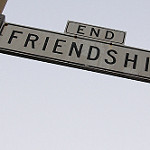(Just a note, this post is from our archives. Some references and links may be from past years.)
August’s topic might be the most controversial. At the very least, I imagine opinions will vary widely, and I welcome any conversation this might spark.
For an agent to be successful, she has to build trust with editors. Editors have very little free time, so they have to trust that what an agent submits to them will be worth reading. To that end, agents build relationships with editors to create that trust. Publishing, in this sense, isn’t the same as selling widgets. It’s rather an intimate industry.
And there is a narrow balance beam an agent has to walk between creating a good relationship with the editor and advocating for the author client.
With this in mind: Good Agents are friendly with editors but not friends with editors.
This is a very important distinction. It’s OK to be friendly in a professional relationship, but being friends poses a potential conflict of interest that might affect the agent’s ability to represent a client.
Quite simply it comes down to this. If an agent has to address a complicated or difficult issue with an editor (an issue that might lead to a split between the author and the publisher), whose side does the agent need to be on? The client’s of course.
But if an agent is good friends with an editor, the agent might not be willing to jeopardize that friendship to be the author’s champion.
At the very least, the agent might hesitate, and that is a real concern. If your agent has committed to representing you, he or she should never put personal priorities over yours.
Even though 95% of the time, it’s peaches and cream with the publisher and author, and a chummy editor relationship won’t be an issue, there will always be that other 5% where a big issue arises. It’s inevitable during a writer’s career.
As a lot of agents and editors are based in New York, where professional functions provide many opportunities for socializing, the line can blur more often than not. That’s something to keep in mind, and one reason being based outside the Big Apple can actually work in an agent’s favor—geographic distance helps create the “friendly with” versus “friends with” dynamic.
Even if an agent strongly believes she can wear two hats and be in agent mode rather than friend mode when the situation calls for it, keep in mind that agents are humans too and, therefore, fallible when it comes to managing the many types of relationships they maintain in their professional and personal lives.
The best agents, even those in New York, are mindful and respect the boundary between “friendly” and “friends.”
******
Summary of article series: Just as the title suggests, because agents are also human beings, they are going to embody both good and bad traits found in human nature. No one is perfect. And as some authors have discovered, some agents are more imperfect than others!
Your job as an author is to objectively recognize those human attributes or failings in your agent and decide whether they impact your career. Hopefully they don’t. To this end, Karen Dionne of Backspace and I have put together a whole list of topics to tackle for “Because Agents Are Human Too.”
Photo Credit: Tinou Bao


Really appreciate the way you help budding authors understand agent’s methods and mentalities. Thanks very much
* agents’
There’s a decent amount of crossover, especially in NYC, of agents who used to be editors and editors who used to be agents. I think that makes it particularly difficult for agents and editors to avoid being friends with each other. Half of them used to be coworkers “on the same side.”
Yeah, I love reading about Human Heart. And also you can read in Perbedaan Cerpen Kontemporer in my site.